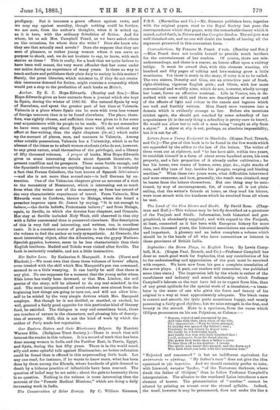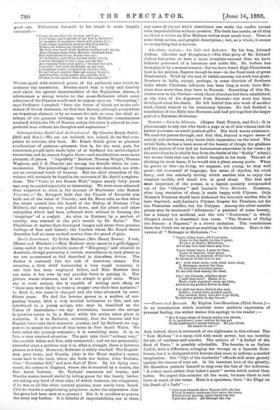Sophocles : the Seven Plays, in English Verse. By Lewis
Camp- bell, M.A. (Kagan Paul, Trench, and Co.)—Professor Campbell has done so mach good work for Sophocles, that any contribution of his to the understanding and appreciation of the poet must be received with. respect. We have now from his pen a complete translation of the seven plays. (A. part, our readers will remember, was published some time since.) The impression left by the whole is rather of the carefulness and industry and sound scholarship which Professor Campbell's labours on the text have led us to expect from him, than of any great aptitude for the special work of a translator,—a trans- lator in the sense of one who gives the force and beauty of his original in a way at least approximately adequate. • The blank verse is correct and smooth, the lyric parts sometimes happy, and mostly possessing a fairly good rhythm ; but we miss strength in the first, and beauty in the second. Here is a specimen, from the curse which CEdipus pronounces on his son Polynices, at Colones :- " Begone, rejected and renounced by me,
And take with thee, thou vilest of the vile, This imprecation :—Vain be thine attempt, In levying war against thy father's race ; Frustrate be thy return to Argos' vale : Die foully by a fratricidal hand, And foully slay him who hath banished thee !
I call, moreover, from his dread abysm, The power that waits upon a father's curse
To bear thee off to his confine : I invoke The spirits who haunt this ground, and the fierce god
Who hath filled you both with this unnatural hate."
"Rejected and renounced" is but an indifferent equivalent for cirom-rucrT4s TE ICCITaTCtlp. " My father's race " does not give the idea contained in yijs ippvAiou. And we should certainly prefer to take, with Linwood, waTpiiov 'EpE $os, "of the Tarturean darkness, where dwelt the father of (Edipus," than to follow Professor Campbell's interpretation. The allusion to the murdered Laius introduces a new element of horror. The pronunciation of " confine " cannot be altered by printing an accent over the second syllable. Indeed, the word, however it may be pronounced, does not make the line a
good one. Philoctetea' farewell to his island is more happily executed
Come, let me bless the region, ere I go. Poor home, sad comrade of my watch, farewell!
Ye nymphs of meadows where soft waters flee ;
Thou ocean headland, pealing thy deep knell, Where oft within my cavern, as I lay, My hair was moist with dashing south-w'nd's spray, And ofttimes came from Hermes' foreland high Sad replication of my storm-vest cry ; Ye fountains, and thou, Lycian water sweet, I never thought to law° you, yet my feet Are turning from your paths,—we part for aye.
Farewell! and send me kindly on my way, 0 Lemnian earth ! enclosed by circling seas, To sail where mighty Fate my course decree',
And friendly. voices points me, and the will Of that heroic power who doth this ackfulfil."
We can speak with unmixed praise of the prefatory note which in- troduces the translation. Besides much that is truly and forcibly said about the special characteristics of the Sophoclean drama, it administers a strong rebuke to the quasi-Hellenism which some admirers of the Classics would seek to impose upon us. "On turning," says Professor Campbell, "from the forms of Greek art to the sub- stance of Greek literature, we find that Beauty, although everywhere an important element, is by no means the sole or even the chief at- tribute of the greatest writings, nor is the Hellenic consciousness confined within the life of Nature, unless this term is allowed to com- prehend man without his thoughts and aspirations."



































 Previous page
Previous page